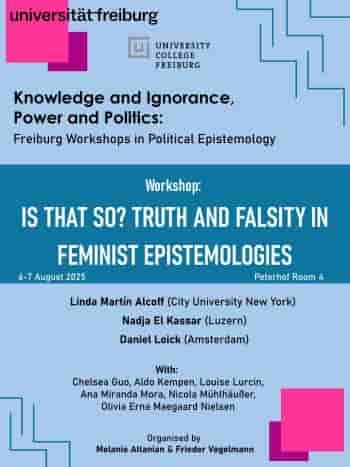“Situated knowledges” (Haraway 1988) and “strong objectivity” (Harding 1991: 138–163) are but two well-known conceptual innovations from feminist epistemologies. In fact, researchers in this field have not just submitted the basic concepts of knowledge and objectivity to ruthless criticism but have advanced innovative re-conceptualizations, Haraway’s and Harding’s among them. However, the closely related concept of truth has received less attention. There are important criticisms of sovereign conceptions of truth, i.e., of conceptions that rely on the infamous “god trick” of a view from nowhere and thereby presuppose the existence of a sovereign epistemic standpoint (Rouse 1996), locating truth beyond power and politics, beyond economic and social conflicts—and beyond all considerations of gender. Yet, with few exceptions (Gorham 1995, Alcoff 1996), there have been little sustained efforts from feminist epistemologies to re-formulate theories of truth or the concept itself in order to find a suitable non-sovereign re-conceptualization. Also missing are sustained arguments for or against retaining or abandoning the concept, as have been put forward for the concepts of knowledge and objectivity. The workshop addresses this curious absence, discussing truth as a concept for/in feminist epistemologies.
References
Alcoff, Linda Martín (1996): Real Knowing. New Versions of the Coherence Theory. Ithaca, NY: Cornell University Press.
Gorham, Geoffrey (1995): The Concept of Truth in Feminist Sciences. In: Hypatia 10 (3), 99–116.
Haraway, Donna J. (1988): Situated Knowledges. The Science Question in Feminism and the Privilege of Partial Perspective. In: Feminist Studies 14 (3), 575–599.
Harding, Sandra (1991): Whose Science? Whose Knowledge? Thinking from Women’s Lives. Milton Keynes: Open University Press.
Rouse, Joseph (1996): Beyond Epistemic Sovereignty. In: Peter Galison and David Stump (eds.), The Disunity of Science. Boundaries, Contexts, Power. Stanford: Stanford University Press, 398–416.
Programm
6. August 2025
13:30-14:30 Nadja El Kassar (Luzern): Towards a Procedural Conception of Falsity and Error
15:00-16:00 Aldo Kempen (Open University Netherlands): Truth and Form: Beyond the Determinations
16:30-17:30 Nicola Mühlhäußer (Bremen) The Relationality of Truth and the Creation of Reliable Facts
18:00-20:00 Linda Martín Alcoff (City University New York): From Feminist Epistemology to Decolonial Epistemology
7. August 2025
10:00-11:00 Daniel Loick (Amsterdam): What are True Practices?
11:30-12:30 Louise Lurcin (Paris Nanterre): Autobiographical Truth, Feminism and Social Epistemology
12:30-14:00 Mittagspause
14:00-15:00 Chelsea Guo (Princeton): False Consciousness for Feminists
15:30-16:30 Ana Miranda Mora (Utrecht): White Feminist Gaslighting and cis-feminist Moves to Innocence as a Way of Engaging with Truth/Falsity
17:00-18:00 Olivia Erna Maegaard Nielsen (Bremen): Suffering from (Un)Truths?
Weil die Plätze begrenzt sind, bitte wir Sie, sich bis 25.7.2025 unter political_epistemology at ucf punkt uni minus freiburg.de anzumelden.
